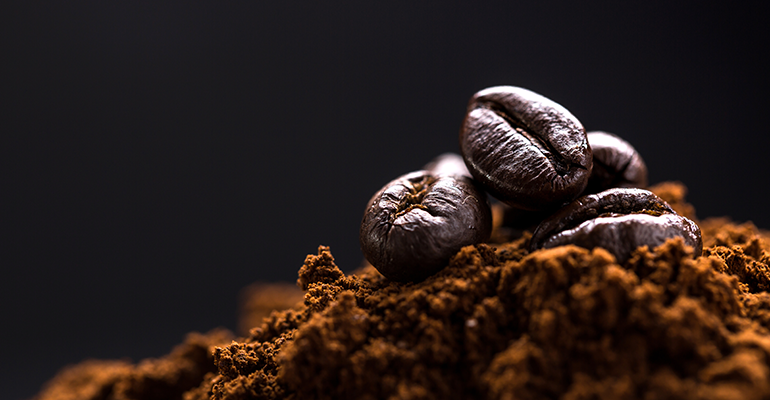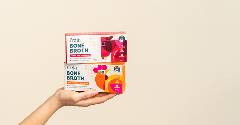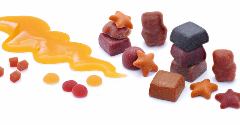News
Coffee, tea, and yaupon: Energy drink brands experiment with caffeine sources
30 Jan 2023
Drinks brands are exploring new types, blends, and sources of caffeine to support and optimise brain performance and cognitive function. We look at some recent product launches from Buzz Lite, White Wolf Nutrition, and My Wellness Mushroom.
Formulations that claim to support brain functioning and stress management are anticipated to be a leading consumer trend for 2023, with consumers looking to their food and drink products to help optimise mental performance and brain function and manage stress levels.

Following the growing consumer interest in brain health benefits, 2023 is expected to see consumers’ interest in the connection between food and the mind increase. As a result, Mintel has revealed that ‘Staying Sharp’ is set to be a significant global trend in food and drink in 2023.
Transforming caffeine’s reputation
The current understanding of the relationship between formulations and mental performance in coffee is limited. “Historically, in the coffee space, there has not been much thought about the relationship between formulations and mental performance,” says Andrew Cooper, CEO and founder of Buzz Lite, speaking to Ingredients Network. Buzz Lite developed its Microdose Roast beta in response, designed to improve sleep and reduce anxiety for those looking to optimise sleep and improve mental health.
“Many of us have experienced the negative side effects of over-caffeination; the jitters, anxiety and losing sleep. Drinking a regular cup of coffee, even as much as six hours before bedtime, can reduce sleep by one hour,” he says.
“Caffeine-induced anxiety is a real thing, 200 mg of caffeine has been proven to increase anxiety and panic attacks,” Cooper says.
Studies have indicated a relationship between caffeine and anxiety and today, ‘caffeine-induced anxiety disorder’ is a subclass in the Diagnostic and Statistical Manual of Mental Disorders.
However, decaffeinated drinks have a stigma of poor taste and no energy. “We want to change that perception,” says Cooper. In the US, consumers drink 400 million cups of coffee a day, yet “many of us have no clue how much caffeine we are consuming”, he adds.
Buzz Lite saw the opportunity to design a drink that gives consumers the “right amount of coffee” for them. The brand states that 10% caffeine is optimal for people to maintain energy throughout the day as it promotes mental clarity and the ability to perform well in daily tasks and routines.
Low-caffeine content
Caffeine and its effects can conjure a negative image. While caffeine consumers value its impact on mental energy, they can express concerns about its potential health effects. For example, two-thirds (66%) of Italian coffee drinkers agree that drinking a lot of coffee is bad for you, Mintel’s research reveals.
Buzz Lite is a blend of caffeinated and decaffeinated coffee that blends to prioritise flavour. The brand focuses on coffee grown in similar regions and tries different combinations of blends and testing to create the ideal formulation.
Launching its formulation, Buzz Lite strived to address the needs of those with a lower tolerance to caffeine and caffeine sensitivity. The founder says that unlike traditional decaf coffee, the brand tests its coffee in a laboratory to ensure it contains 20 mg per serving. It uses a natural sugar decaffeination process rather than the traditional decaffeinated method, which uses a chemical process that affects flavour.
Buzz Lite conveys the benefits of its low-caffeine drink on mental performance via the advantages of the coffee bean itself, including antioxidants, vitamins and minerals. “My goal is to help people feel right by doing less,” says Cooper.
Banking on caffeine blends
Around the world, drink manufacturers are creating unique caffeine blends that appeal to consumers’ interest in energising ingredients and caffeine offerings that seek to support optimum mental performance.
 © AdobeStock/rzoze19
© AdobeStock/rzoze19
Australian brand White Wolf Nutrition’s Smart Energy drink is made with ginseng, L-theanine, caffeine and vitamins B6 and B12. Mission Yerba Mate Tea is a UK-developed product that sits in the low caffeine space. The tea, which contains peppermint and liquorice, has focus and clarity claims. South African brand, My Wellness Mushroom, has also released its Keto Coffee product, stating that its coffee and mushroom blend can prevent a caffeine crash.
Uncovering new caffeine sources
To help make the new era of caffeine possible, manufacturers are discovering new sources of moderate caffeine to help drinkers increase their productivity levels. German brand The Barn has released a ‘naturally low-caffeine Laurina varietal’, which contains Laurina coffee beans. Tipped as having future potential, the beans are naturally low in caffeine and drought-resistant.
We may also see producers tap into the yaupon holly plant for caffeine. The plant, native to north America, is known for containing 30% less caffeine than coffee and continues to grow in extreme weather.
Related news

Bone broth: From old-fashioned to en vogue
24 Nov 2025
OXO’s entry into bone broth has turned the spotlight on this small but high-performance category – and there is still scope for growth, especially in the area of GLP-1 support.
Read more
Matcha madness: Why green is this year’s hottest colour
19 Nov 2025
Five years ago, it was a struggle to find matcha outside of Japan. Now it seems to be popping up everywhere, from coffee shops to supermarket shelves.
Read more
How younger consumers are redefining ingredient choices and rejecting brand loyalty
18 Nov 2025
Gen Z and millennial consumers’ preferences for transparency, functionality, and purpose are “redefining the very nature of consumption itself”, says SPINS.
Read more
Hybrid formats and flexible positioning to disrupt category norms in 2026
17 Nov 2025
Trend forecasters expect food and drink to move more fluidly across occasions, functions, and formats as consumers seek versatility, novelty, and convenience.
Read more
Empowering innovation in fortification and colouration
13 Nov 2025
Divi’s Nutraceuticals offers a large portfolio of innovative, high-quality ingredients for foods, beverages, and supplements, with bespoke solutions and expert support for product success.
Read more
Predictive maintenance redefines powder mixing reliability
13 Nov 2025
Mill Powder Tech's smart control systems harness real-time data to help the food and biotech sectors achieve zero downtime and smarter output, alongside rigorous GMP standards and ambitious ESG goals.
Read more
From fruit to functional solutions: Meet Paradise Fruits at Fi Europe in Paris
13 Nov 2025
Paradise Fruits Solutions and Paradise Fruits Health will showcase their combined expertise in delivering innovative, fruit-based solutions to the food and beverage industry at the upcoming Fi Europe trade show (2-4 December 2025, Paris).
Read more
Danone highlights digestive health as potential ‘tipping point’ for food industry
13 Nov 2025
Danone is betting on a food industry “tipping point” that will bloat the market for healthy products, particularly those related to gut health.
Read more
Bord Bia presents Irish dairy ingredient suppliers at Fi Europe
6 Nov 2025
Dairygold Co-operative Society, The Carbery Group, and Ornua Co-operative: Meet with sustainable producers of Irish dairy ingredients at Food ingredients Europe 2025, Hall 7.2 Stand M18.
Read more
Ingredient quantities mislabelled on popular protein bars, independent tests show
5 Nov 2025
Some popular protein bars contain more fat, carbs, and/or sugars than claimed on their labels, independent nutrition testing reveals.
Read more